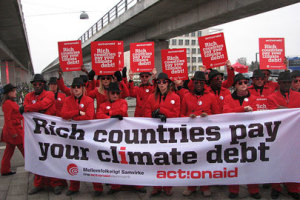We established in the last article on the post-carbon energy transition that humanity is dependent on fossil fuels for our modern way of life and that, despite the claims of renewable energy proponents, renewables cannot practically power our electrical grids, fuel our transportation systems, or heat our houses in the winter. If that is the case, why are governments and corporations blamed for climate change, and who is ultimately responsible for it? In this post we’ll discuss the social aspects of the post-carbon energy transition in an attempt to put into perspective the task ahead.
The Limitations of Government Power
Our civilization is dangerously dependent on carbon-based energy and governments often take a lot of the blame for the post-carbon transition not materializing. Is this a fair assessment of blame? I would argue that it isn’t, for several reasons.
The first is, what do we expect our governments to do? Government could, of course, increase the share of energy generated by renewables through tax incentives for certain technologies and efficiencies (as most western governments do), or allocate public money to energy-generation research (which they also do), but the power of liberal democratic governments to make this kind of change is limited. Financial incentives do not make technologies more effective, but simply lower the price of purchasing them. If renewable energy sources such as wind and solar were as reliable as nuclear, hydropower, or natural gas at generating electricity, tax incentives or subsidies would be a great way to ‘green’ our electricity system. Unfortunately, these renewable alternatives are not as economic or convenient, so government subsidies may not be achieving their aims and taking away budgetary resources from things that could be beneficial to marginal groups (community housing, drug addiction clinics, after school programs).

If you’re responsible for a national budget, you’re going to fund programs that demonstrate value over those that don’t. The problem with subsidizing renewable energy projects is that they are really expensive and there is a limit to what those technologies can accomplish. Similarly, funding research to solve our energy crisis is akin to playing the lottery, there is no guarantee that your funding will achieve your goal. Don’t take this the wrong way; I’m not saying governments shouldn’t fund these activities. They should and they do. However, keep in mind resources are limited, and it’s hard to justify large government expenditures on programs that may not accomplish the things we would like them to. Obviously, government budgeting is an extremely complex process and simplifying it in a paragraph trivializes the decisions that go into a budget, but the point is that there are trade-offs… and governments are not willing to bet on unproven technologies.
There are governments, namely China’s, that have the ability to force citizens to change behaviour and gamble on new technologies. However, for the most part, these governments are in the developing world and have no interest in unilaterally lowing their standards of living, especially when the west has enjoyed relatively high standards of living for the past hundred years. Don’t hold your breath waiting for the developing world to lead the way on climate change. It will be up to liberal democracies to do this but the ironic thing is, due to the nature of our political system, inaction might be a pretty likely outcome.
Carbon Pricing and International Agreement on Climate Change
One thing government can do which would be effective, from an economic perspective, is to put a price on carbon. Whether this is a tax or a cap and trade system, it doesn’t matter. Essentially, if carbon costs more money to use, we will use less of it. This would be a start. The more carbon costs, the more energy efficiency become a real way for companies to improve their margins and for consumers to reduce spending on things that pollute. Increased costs, in addition to incentivising efficiency, would also incentivize innovation. New and novel ideas for enhancing current technologies, or brand new technologies would be worth a fortune. Increased prices for goods that require fossil fuels would also have an effect on consumerism, perhaps forcing people to only buy what they truly needed (in western countries anyway).
All the above outcomes are good things. There would obviously be economic and life-style draw-backs to putting a price on carbon, and the extent of those drawbacks would be dependent on the price imposed. A prohibitive price would end all use of fossil fuels and a price that is set too low would have negligible effects on use. The sweet spot would be a price that was enough to deter unnecessary fossil fuel use while still allowing an industrial society to exist.
The biggest problem with this scenario, however, is that all governments must roughly agree on the price of carbon. The reason why we need international consensus is to avoid a situation where one state reduces their fossil fuel usage only to see emissions from another state grow at an equal rate. Getting international agreements on climate change initiatives have thus far proven elusive because of competing national interests. With any international effort to combat climate change there will be winners and losers, which results in competition between states not to be on the losing side. This is not to say international agreements are impossible but effective agreements, I would argue, are near impossible when the economic consequences are extremely high.

Blame Corporations for Climate Change – They’re Easy to Hate
Simply put, climate change is a civilizational crisis and not corporate or government malfeasance. It’s true that corporations can and do destroy the environment in the pursuit of profits. Examples include modern agricultural run-off, manufacturers that skirt emissions standards, or mining operations that leech heavy metals. However, climate change is about the collective utilization of a resource that emits. No one industry, country, or company can claim sole responsibility, or even the lion’s share of responsibility. We are all responsible (maybe a little more responsibility in the western world).
Recently a paper was published in the journal Climate Change which allocates blame for climate change to the 90 biggest ‘emitters’. It wasn’t surprising that the companies most responsible for climate change were found to be oil companies. But oil companies didn’t burn all that oil; they are being held responsible for making oil available… but how honest is that? If Shell does not produce petroleum, is that petroleum then not available or would it just be made available by another corporation? Furthermore, the products that corporations offer are readily consumed. If there was no demand, there would be less pollution. How can oil companies be held responsible for providing a product that everyone needs and wants?
Energy corporations like Shell and BP are not angels at all. They knowingly support repressive regimes around the world that imprison and torture people and make money doing so. Oil and mining companies also bargain with governments for low levels of environmental oversight thus poisoning the living spaces of marginal peoples around the world, also in the pursuit of profit. They do build schools and offer jobs to local residents to compensate for some of this poor behaviour, but their interest in these communities vanish once the economic motive evaporates. This leaves communities in the developed world with a generation of environmental damage but no lasting development or benefit. That being said, as nasty as some of these companies can be, they are not responsible for climate change. They simply provide the product which causes climate change, but it’s consumers who willingly support them.

Blaming Ourselves is Hard to Do
Why do we blame governments and corporations for the state of the climate? My argument is that it’s easier to blame these organizations than it is to blame ourselves or our neighbors. Exxon and the US have logos, heads to their administrative organizations, and they have actions by which we can base our judgements. We anthropomorphize these organizations and claim their leaders are responsible for climate change because they have all the power and the public has none. I can’t accept this argument. Exxon does not create the market for oil and President Obama did not design our market economy or create the conditions of rampant consumerism. Exxon and President Obama are significant actors within the market but neither of them can bend it to their will.
If anything is to blame, it’s oil itself for being so amazingly useful and plentiful. If oil wasn’t so useful we wouldn’t depend on it, and if it wasn’t so plentiful it wouldn’t be so cheap and thus hard to replace. This is another way of saying our consumption of fossil fuels is to blame. Video games are to blame. Tropical fruit in the winter is to blame. Backpacking through Europe is to blame. We are to blame.
If We Are to Blame, What’s the Solution?
So what is to be gained by properly assigning blame? It’s not that finding individuals are to blame for climate change solves anything, but it removes the inclination to blame amorphous organizations for a global phenomena. It’s also pretty clear that our lifestyles don’t seem to be going anywhere, and it’s the opinion of this publication that our current living standards are desirable, so we can’t just stop using fossil fuels. What is to be done? It would be a tall order for each of us, as individuals, to deal with climate change, but perhaps the solution could be partly solved by aggregated individual actions.
As mentioned above, efficiency and conservation can go a long way in reducing our energy needs. This can include really complicated things like carbon nanotube transmission lines from power plants, but this also includes really simple things like carpooling, using energy efficient lights, or keeping your house at a comfortable 18c and putting some slippers on while you’re at home. While these things aren’t going to save the planet (they really won’t), it does instill a new culture around energy that values efficiency for efficiency’s sake. This shift in mind set could be very important; we might start asking ourselves the energy cost of an activity rather than the monetary cost in the not too distant future.
The real game changer would be a technology that produced abundant, reliable, convenient, and affordable energy without significantly altering the climate. There are some candidates for this already (thorium, fusion, and others), but there are myriad challenges to achieving this goal. Until we do, it would be wise to minimize our impact as best we can, while still living a modern lifestyle, or we’ll only have ourselves to blame.
